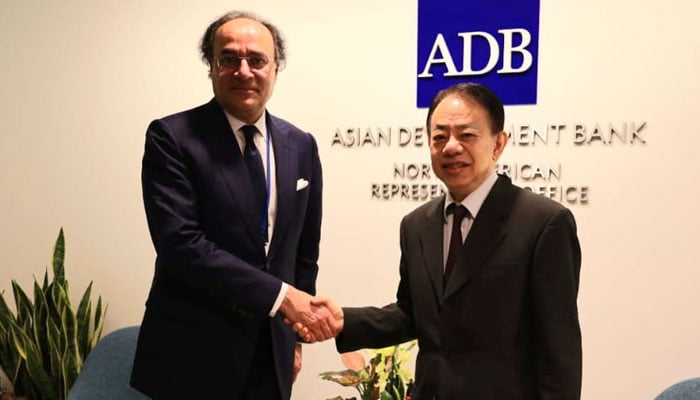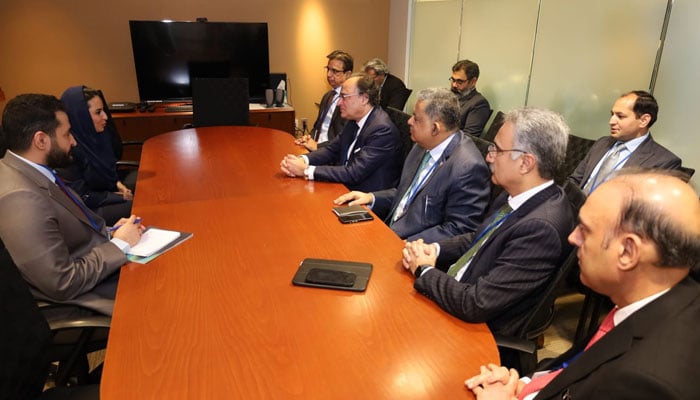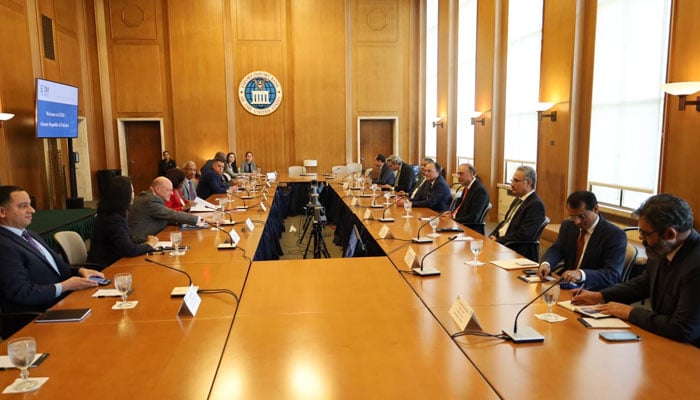ISLAMABAD: Finance Minister Muhammad Aurangzeb, while speaking at an event on the sidelines of World Bank-International Monetary Fund (IMF) Annual Meetings, has stressed the need for reforms in taxation and reduction in energy subsidies to address various economic challenges faced by the incumbent government.
Participating in a panel discussion in the high-level event “Growing Stronger: An Urgent Call to Improve Child Nutrition” organised by the WB, the finance minister underscored the need for improvement in the management of state-owned enterprises (SOEs) to create more fiscal space for increased investments in climate change, population control and child stunting.
The minister’s remarks come as he is leading Pakistan’s delegation to the WB-IMF meeting being held in the US capital from October 21 to 26.
Furthermore, during a meeting with US Assistant Secretary of State for Energy Resources Geoffery Pyatt, the finance czar briefed the former on the challenges faced by the energy sector and reforms being introduced by the government.
He also thanked Washington for its offer of support with regard to Islamabad’s transition to renewable energy.
Furthermore, as part of his ongoing interactions in Washington, Aurangzeb also met President Asian Development Bank Masatsugu Asakawa and lauded the bank’s partnership with Pakistan to support its development agenda and welcomed the launch of the new office of ADB in Islamabad.
He hoped that the Country Partnership Framework of ADB would be finalised soon.
Commending the ADB for successful completion of the Capital Adequacy Framework and exemption provided to Pakistan from the surcharges beyond exposure limits for the next three years.
The FinMin also praised the ADB’s support for a Policy-Based Loan of $500 million for the crucial Climate & Disaster Resilience Enhancement Program, which is going to be considered by the ADB Board on October 29.
Additionally, both sides agreed on the need for domestic revenue mobilisation, regional cooperation and early completion of the ADB office in Islamabad.
Meanwhile, during a meeting with representatives of S&P Global, Finance Minister Aurangzeb accentuated the update on macroeconomic stabilisation, fiscal consolidation measures and external account developments which were reflected in improving key indicators across the board.
Informing the delegation that government financing cost was coming down which would reduce the debt servicing cost, he expressed the hope that S&P Global would upgrade the country’s rating soon.
The minister also held a meeting with Secretary General of the Digital Cooperation Organisation (DCO) Deemah Al Yahya wherein he underscored the enormous potential that existed in the information and communication technology (ICT) sector in the country.
He further apprised the official that Islamabad was investing in an inclusive digital ecosystem to improve governance, citizens’ quality of life and economic well-being and emphasised closer collaboration in the digital infrastructure, digital economy, digital FDI, digital skills, and digital governance.
Separately, Aurangzeb also thanked Dubai Islamic Bank Group CEO Adnan Chilwan for the bank’s timely support in bridging the financing gap and appreciated that the bank was expanding its operations in Pakistan.
He also informed him that the country’s credit rating had recently been upgraded by Fitch and Moody’s and signalled the intention to tap into International Capital Markets (ICM) through an inaugural panda bond to diversify the financing base.
Meanwhile, during his interaction with President of Export-Import (EXIM) Bank Reta Jo Lewis, the minister urged closer collaboration between the Exim Banks of the two countries and welcomed Exim Bank interest in the energy, minerals and IT sectors in the country.
The finance czar further assured sharing the data to enable the Bank to evaluate its entry into Islamabad’s market and sought clarification on the US nexus requirements for goods and services financed or insured by the Exim Bank.








